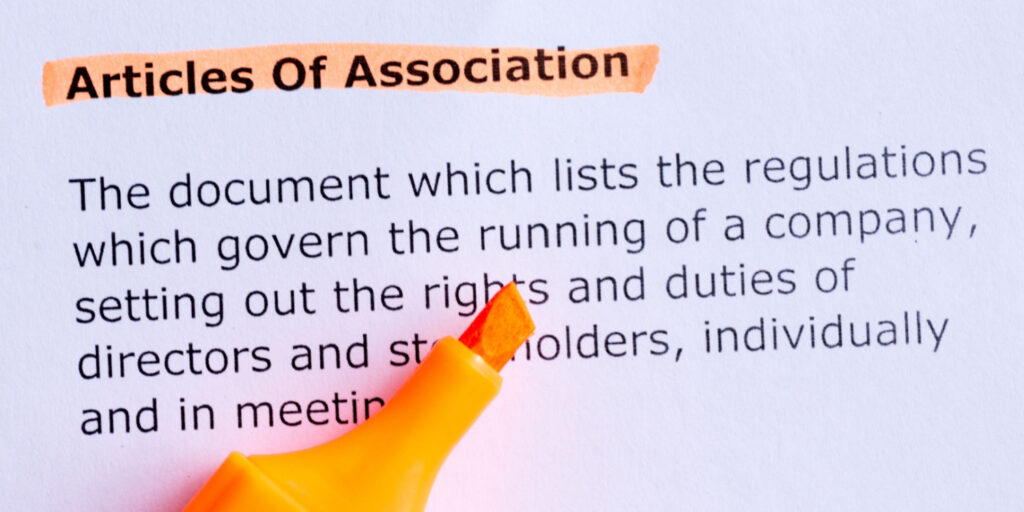You can change your company’s articles of association at any time if 75% of members agree to it. Since this is the governing document that sets out the purpose and rules of the business, many companies need to update their articles at least once during their lifetime.
Below, we explain the steps required to do this, including the requirement to obtain approval from members and notify Companies House. We also discuss some of the most common reasons why such amendments may be necessary or beneficial to your business.
Making changes to your articles
The articles of association regulate every aspect of a company’s internal administration, so they need to be fit for purpose. Over time, you may find it necessary to update your company’s articles to support the changing structure, objectives, or requirements of your business.
Depending on the complexity and extent of these changes, this may involve:
- rewording one or more existing provisions within the current articles
- adding, removing, or replacing certain clauses
- creating entirely new or bespoke articles of association
To make any such changes, the company’s members (i.e. the shareholders or guarantors) must pass a special resolution, either in writing (a ‘written resolution’) or at a general meeting.
- Does my company need articles of association?
- Model Articles: Sole director issues and how to solve them
- Amending the articles of association for a charitable limited company
If you’re the sole director and member of a company, the process is fairly straightforward, because it is your decision alone. In all other cases, the resolution must be approved by a 75% majority of eligible members’ votes.
Passing a written resolution
The quickest and easiest way to change the articles of association is by written resolution. This is the preferred option for many companies, because it removes the need to arrange and attend a general meeting, which is not always convenient or practical in every situation.
The steps required to pass a members’ written resolution are as follows:
- Prepare the proposed special resolution, along with a statement that explains to members how to signify their agreement and the deadline for doing so.
- Send the resolution and statement in hard copy or electronic form to every member who is eligible to vote. You can send individual copies to everyone at the same time, or you can circulate the same copy to each member in turn.
- Once approved, submit a signed copy of the resolution and a copy of the new articles to Companies House. This must be done within 15 days of the resolution being approved.
The new articles will take effect as soon as the resolution has been passed. Retain a copy of both the resolution and new articles at your registered office address. You may also wish to provide a copy of the articles to the directors, members, and company auditor (if applicable).
Passing a special resolution at a general meeting
You can also pass a special resolution during a general meeting of the company’s members, whether this is a planned AGM or an extraordinary meeting called for the express purpose of approving the new articles.
This is the preferred option if, for example, the company has lots of shareholders, or the decision requires a significant amount of prior discussion.
- A guide to limited company resolutions
- General meetings – your questions answered
- A guide to keeping meeting minutes
The steps required to pass a special resolution at a general meeting are as follows:
- Hold a board meeting to discuss and prepare the proposed resolution, and agree to call a general meeting.
- Send notice of the general meeting to all eligible members at least 14 days in advance. You must also provide details of the proposed resolution, including an overview of the changes and a copy of the new articles.
- Present the resolution to the members at the meeting, allowing them to discuss the proposed changes and cast their votes.
- Once approved, send a signed copy of the special resolution and a copy of the new articles to Companies House within 15 days of the meeting.
The new articles will apply as soon as the special resolution is approved at the meeting. Companies House will also publish these documents on the central register of companies, where they can be publicly viewed online.
Notifying Companies House
As previously mentioned, you are required to notify Companies House within 15 days of making any changes to the articles. To do so, you must send a copy of the resolution and the new articles.
Depending on the circumstances, you may also need to include:
- Form CC04 – if you are updating your company’s objects (i.e. purpose) in the articles
- Form CC05 – when a change in the law requires you to alter the articles
- Form CC06 – if the change has been ordered by the court or other authority
You can submit the required documents using the document upload service, or by sending paper copies by post to Companies House in Cardiff, Edinburgh, or Belfast (depending on which part of the UK your company is registered).
Are there any restrictions when changing the articles?
Companies have a relative amount of freedom with their articles of association, but there are certain rules and restrictions to be aware of:
- No provisions within the articles can override company law. Any changes you make must comply with the Companies Act 2006.
- To protect the rights of all members, particularly minority shareholders, any amendments or alterations must be in the best interests of the company as a whole. Changes that only benefit majority shareholders, or a particular class of member whilst being unfairly prejudicial toward the minority or a specific class, are unlikely to be enforceable.
- No member is bound by any alteration that is introduced after the date on which they become a member, if the alteration requires them to take more shares than they already have at that time, or if it increases their liability to contribute additional capital to the company. However, neither restriction applies if the member agrees in writing to be bound by the alteration.
- Whilst it is possible to attach conditions to future alterations to the articles (e.g. certain decisions require unanimous approval of members), you cannot introduce a provision that entirely prohibits members from making any future changes at all.
Whilst you are under no legal obligation to use a solicitor when creating or changing your company’s articles of association, it may be worthwhile to ensure that this key governing document is lawful and fit for purpose.
Why would a company change its articles of association?
There are countless reasons why companies decide to change their articles of association.
Sometimes it is necessary due to new laws or amendments to existing legislation, or because the company has been ordered by the court or a regulatory body (e.g. the Charity Commission) to carry out certain changes.
Most of the time, however, companies alter their articles because the current version is either lacking in clarity, or is no longer suitable as a result of changes within the business. Below are some common examples:
Shareholders’ rights
Clarifying or enhancing the rights of shareholders is perhaps the most crucial reason to change your company’s articles of association. Important issues that you may wish to consider include:
- pre-emption rights
- drag-along and tag-along rights
- transmission of shares (i.e. automatic transfer) in specified situations, such as the death of a shareholder
- voting and dividend rights attached to shares
- policy for declaring and distributing dividends
- decision making rules and procedures, including reserved matters
- restrictions on share allotments and share transfers
- share buyback clause
- restrictive covenants
Ideally, all such matters related to shareholders should also be set out in a shareholders’ agreement. This document is optional and supplementary to the articles, but there should be no conflict between the two. Therefore, if you change your company’s articles, you will also need to update any shareholders’ agreement that you have in place.
Membership criteria
Having control over who can and cannot hold shares in your company is important. Some companies impose a minimum age requirement or a maximum membership limit. Others may stipulate that only family members or individuals with particular experience, affiliations, or objectives may be members.
Appointment of directors
There are very few statutory restrictions when it comes to the appointment of company directors.
You may wish to consider, for example, whether existing directors should have the power to appoint new directors without shareholder approval. Should directorship be restricted to members, or people with certain qualifications? Do you want to place a limit on the number of directors the company can have at any one time?
Directors’ powers
Under the Model articles of association, company directors have a great deal of power and control over day-to-day affairs. Unless every shareholder is also a director, they have very little say over routine management decisions and the direction of the company.
For this reason, some companies change their articles to limit directors’ powers and stipulate that certain decisions cannot be made without the consent of members – for example, issuing new shares or approving the transfer of shares.
Issuing different share classes
The Model articles are only suitable for companies with ordinary shares of equal value. If you want to issue any other type of share or create multiple share classes, you will need to change your company’s articles accordingly.
Authorised share capital
Some companies wish to limit the amount of shares that they can issue to a fixed amount (e.g. £100 divided into 100 shares with a nominal value of £1 each). This restriction is known as ‘authorised share capital’.
Until 2009, limited companies had to specify their authorised share capital in their memorandum of association. This is now optional, but some companies choose to specify a maximum amount of share capital in their articles to prevent the excessive dilution of existing shares.
Dispute resolution
Shareholder disputes are common, but the Model articles are rather lacking in this area. To ensure that any potential conflicts can be dealt with as quickly and effectively as possible, it’s important to include a clear dispute resolution procedure within the articles.
Company meetings
There is no legal requirement for private companies to hold board meetings or general meetings, but there is significant value in doing so. Therefore, you may wish to change your company’s articles to state that meetings must be held at regular intervals – e.g. every quarter, or the end of each financial year.
Review your articles of association regularly
Directors and members should review their company’s articles of association on a regular basis to ensure they are fit for purpose. Unsuitable or outdated articles can give rise to entirely avoidable obstacles, problematic decision-making, and shareholder disputes, all of which could be detrimental to the company’s success.
Thanks for reading
Changing your company’s articles of association is relatively simple. However, to ensure compliance, you must follow the correct procedures, as outlined above.
Depending on the needs of your business and the types of changes you’re planning to make, it may be advisable to consult a corporate solicitor, but this is entirely optional.
Our company formation team is on hand to answer any questions you may have, so please feel free to get in touch or post a comment below.
Please note that the information provided in this article is for general informational purposes only and does not constitute legal, tax, or professional advice. While our aim is that the content is accurate and up to date, it should not be relied upon as a substitute for tailored advice from qualified professionals. We strongly recommend that you seek independent legal and tax advice specific to your circumstances before acting on any information contained in this article. We accept no responsibility or liability for any loss or damage that may result from your reliance on the information provided in this article. Use of the information contained in this article is entirely at your own risk.














Join The Discussion
Comments (4)
Hi hope you can help with my question please.
My question is about the 75% of shareholders approval. Our shareholders are reluctant to attend a general meeting or responded well to written requests. Providing we have 75% agreement from people who did respond, would that be sufficient.
Thank you for your kind comment.
Unfortunately as we are not regulated to provide legal advice, we are unable to provide advice on specific scenarios. We would recommend contacting a solicitor for further assistance.
Please accept our apologies for any inconvenience caused.
Kind regards,
The 1st Formations Team
I just want to change one Article in the Articles which is outdated and substitute another but make no other changes…would this be ok with Companies House ?
Thank you for your comment, Bob. Yes, provided there are no restrictions in place, you can absolutely only change one part of the Articles.
Kind regards,
The 1st Formations Team